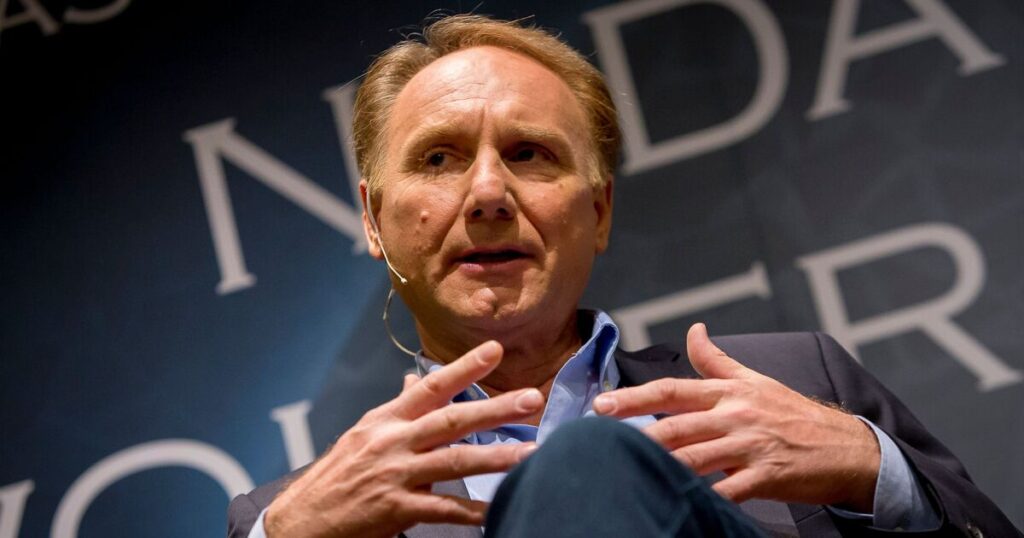

Dan Brown has sold more than 250 million books yet can’t get a break from the critics (Image: NurPhoto via Getty)
Dan Brown has a simple rule of thumb when it comes to reviews. “Don’t read your press,” he tells me. “If you read your good press, you’re going to get lazy and conceited – if you read the bad stuff, you’ll get insecure and depressed.” The guidance came from a hugely successful woman writer, shared after some “particularly vicious reviews”, who concluded: “Neither one is helpful, so just put on the blinders, write the book you would want to read, and get on with your life.”
How’s that going, I wonder? The bestselling US author has the grace to look a little sheepish as he smiles: “It’s been great advice, but I haven’t quite been able to not read my bad reviews or my good reviews…” Having enjoyed global success tackling big issues of religion, science and technology – with hit movie adaptations starring Tom Hanks – the 61-year-old has been blessed with almost everything except unequivocal critical acclaim.
Studying the response to his new book, The Secret of Secrets, it’s no stretch to suggest he might be the ultimate ‘Marmite’ writer, beloved by readers since his 2003 blockbuster The Da Vinci Code – which suggested Jesus and Mary Magdalene had a child together – yet derided by the critics.
There’s an element, I suggest, of ‘tall poppy syndrome’ – the backlash that so often follows enormous success and the strange habit we have of trying to knock down anyone we think might have got a bit too big for their boots.
Happily, despite the fact he’s a bona-fide publishing sensation, there’s no sign Brown’s ego has outstripped him – and he always writes the books he wants to read. Talking for nearly an hour about the big, meaty ideas that make them so compelling, he comes across as likeable, self-deprecating and enthusiastic. “I write in a very specific, intentional way,” he continues. “Some people love the way I write, some people can’t stand it. I’ve just come to accept that the people who like what I do are my fans and the people who don’t are my critics.
“Tall poppy syndrome is certainly experienced around the world – particularly in the UK – but it’s difficult. In any creative art, you’re not gonna please everybody. Fortunately, I pleased enough people that I’m able to continue writing.”
He pauses: “There’s this strange perception that, if something is too enjoyable, it can’t possibly be something of quality, it can’t be art. But to write something that has mass appeal, and I’m clearly biased, is far more difficult. The fact these books are fun is the reason people read them.”
Having sold a staggering 250 million books in 56 languages, it only goes to show that the public knows best. It also suggests Brown’s new high-octane mystery, of which more shortly, will be another surefire hit.
Fittingly for an author whose charismatic hero-cum-alter-ego, genius symbologist Robert Langdon, played on screen by Tom Hanks, is a dashing Harvard academic and researcher (“Harrison Ford in tweed”, in one description), Brown is talking from a library. He has Zoomed in from his wood-panelled study in New Hampshire complete with two-storey bookshelves filled with his work.
He chuckles: “I had a couple over the other night who had a little girl and she was a book lover and they said, ‘He’s got a library in his house’. And she was so excited. But she came back and said, ‘It’s all the same guy, there’s no children’s section!’”
Joining them on the shelves (and on those of his readers around the world) this week will be Brown’s first book in eight years since 2017’s Origin tackled artificial intelligence and its impact on our future. “It’s no secret I like to write about big topics – the history of Jesus, or artificial intelligence, overpopulation, these sorts of things,” he says.
“I love to fuse the very old and the very new in these books. I write about Vatican secrets and anti-matter, I like that juxtaposition.”
This time Brown tackles one of the biggest subjects of all – human consciousness, the idea of an afterlife and the interconnectedness of our minds. It’s a topic on which he expects our understanding to dramatically alter within the next decade. Social media, he notes, is already a kind of “hive mind”.
“It’s the lens through which we see reality and ourselves,” he explains. “Our misunderstandings and misperceptions make it so ripe for a very revelatory tale. I thought, ‘This is something I want to learn about’. And if history is any guide, other people will share my taste.” No wonder it’s taken eight years to write, then.

Tom Hanks as Robert Langdon and Audrey Tautou as Sophie Neveu in The Da Vinci Code (Image: Sony Pictures)
“Human consciousness is a very ethereal topic. I had to figure out how to make it into something that felt concrete and urgent. It’s kind of like trying to hug smoke – you just can’t quite get your arms around it.” His research – including into so-called ‘near-death’ experiences on the operating table, led him to see the world quite differently.
“I fear death much, much less,” he tells me. “I’m not in any hurry but I’ve really come to understand that there is something beyond… I don’t think it’s any religion’s version of heaven or hell, it’s something else entirely.
“But it is something and it sounds quite unifying, quite enlightened, quite affirmative. All the adjectives you hear from people who have skirted the edges [of death] are incredibly positive and peaceful – the notion that we’re all alone in the world is an illusion.”
Set in Prague, the action begins when Langdon, in town for a conference, returns to his hotel after a morning swim to discover his Princeton neuroscientist lover Katherine Solomon has vanished – along with the only hard copy of her new book. Solomon’s disappearance, Langdon realises, is linked to her work – which she insists will change our entire understanding of human consciousness (and has also been stolen from her New York publisher’s server in an audacious hack).
But can he find her, and retrieve the manuscript, before it’s too late, in a chase through one of Europe’s most ancient and mysterious capitals? “Prague is alleyways, secret passageways, towering spires. It’s a dramatic city,” smiles Brown. “It’s custom-made for Langdon to get lost in.”
This protagonist, says Brown, is “Really the guy I wish I could be. We share interests in symbolism and philosophy and art and architecture. He’s passionate about all the things I’m passionate about but he’s much brighter than I am. And he lives a very exciting life. My life, of course, is spent primarily in the dark, alone in my pyjamas!”
Featuring CIA assassins, local thugs and a mysterious ‘Golem’ (based on the famed Jewish folklore creature), the adventure unfolds at breakneck speed. With mysterious underground labs, religious conspiracies aplenty and frequent (and literal) cliff hangers, plus a generous helping of puzzles, codes and symbols waiting to be decoded by Langdon, The Secret of Secrets is classic Dan Brown territory.

Dan Brown’s 2003 novel The Da Vinci Code became a worldwide sensation (Image: PA)
“Readers are smart people. They like to learn and my job, first and foremost, is to entertain,” explains the author. “Once that’s taken care of, let’s make sure there’s enough here so that, as you turn the page, you’re going, ‘That can’t possibly be true?’ And you turn to Google and think, ‘Wait, that was the result of an experiment? That makes no sense. How could that be?’ Those sorts of moments are what I’m hoping readers will have.
“Historically, as I say in the novel, when scientific models accumulate enough anomalies, you know they’re not right. That’s where we are with human consciousness.”
Brown became a “master of failure” early in his career, for which he remains grateful. Having studied creative writing and music, he worked as a pianist and composer.
“I went to Los Angeles, signed a record deal, made a record. Nobody bought it. It was a commercial failure. And I thought, ‘Well, I’m going to try to write a novel’,” he recalls. “So I wrote a novel, and the very first publisher at St Martin’s Press who read it, bought it. I thought, ‘Oh, publishing is so easy. This is going to be great’. That book, Digital Fortress (1998), came out and nobody bought it – absolutely nobody.”
In fact it wasn’t until his fourth novel, The Da Vinci Code, that he was discovered and all his previous books became overnight hits. “It’s a great reminder for young writers who haven’t been published or haven’t had a lot of success. Just because it hasn’t been a success, doesn’t mean it doesn’t have value, and it may find its audience later in your career.” As with previous books, The Secret of Secrets contains the caveat that pretty much everything in it is true to life. Doesn’t that rather make him a hostage to fortune.
After all, part of the backlash against The Da Vinci Code came from organised religion objecting to his interpretations? “I have an interest in the real world, and so I set these stories in the real world,” he insists. “Literally hundreds of fact-checkers go through these books.
“We’re incredibly careful because of that statement, but I want readers to know, ‘Yes, you’re reading a fun fictional story, but when Robert Langdon looks at a painting like The Last Supper, or when you look at a scientific experiment like some of the ones revealed in The Secret of Secrets, I’m not making that up – this is really what happened in a lab.

Prague’s Charles Bridge which features in dramatic scenes in The Secret of Secrets (Image: Getty)
“You can say that’s totally impossible but if you go home and look it up, you’ll find out that a lot of people are really, really puzzled… but it is happening.”
As well as the novel, there’s a forthcoming Robert Langdon TV series in development with Netflix – kicking off with The Secret of Secrets with a new, as yet un-cast, leading man. “It’s been green-lit. The writer’s room is going full blast, and I see things from time to time. I try to stay out of their way but I have enormous faith that they’re doing a great job,” he says.
While he’s not working on a book at the moment, it would be too confusing while he’s promoting The Secret of Secrets, Brown rises at 4am every day to write. “I like that time of day. Your brain is in that mode where it’s like, ‘Well, here’s a blank page. Let me just make stuff up and fill your head’. So I like to sort of harness that frame of mind and go to work immediately without checking email or the internet.
“I don’t get it right the first time unfortunately and I’ve learned to use the delete key liberally, which is why these books, I hope, read like a rocket. Over the last seven years, I probably wrote a million words to end up with 200,000.”
Looking into the future, as is his habit, does he foresee a world when AI can take over his work and create new Robert Langdon adventures? “I’m happy to report that, at least in my experience, AI is absolutely incapable of outlining a novel. I’ve said, ‘Write me a description of Prague Castle in the style of Dan Brown’, and I’m like, ‘I can’t be that bad!’ So either I’m really bad or AI’s bad – I’m not sure which.”
So Brown truly is inimitable then. Loved by readers, if not the critics, and impossible to replicate.
- The Secret of Secrets by Dan Brown is published by Bantam and out now. Buy it here

The Secret Of Secrets is Brown’s first novel in eight years (Image: Bantam Books)
 Latest Breaking News Online News Portal
Latest Breaking News Online News Portal






